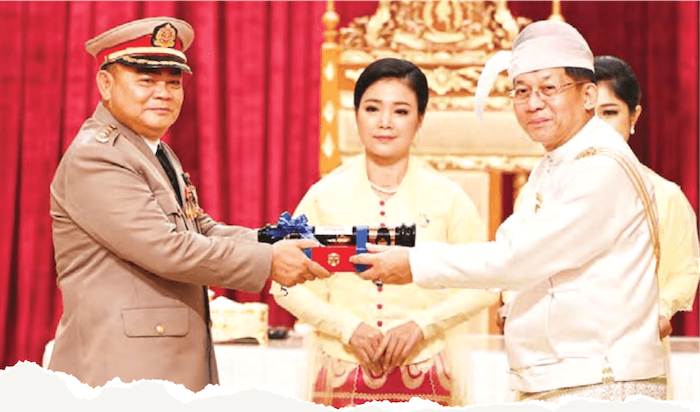Myanmar Spring Chronicle – October 23 Perspective
(MoeMaKa, October 24, 2025)
Online “Kyar Pyan” Scams vs. the Junta’s Political “Kyar Pyan”
News about KK Park—a site south of Myawaddy in Karen State known as a base for online financial fraud syndicates (locally called “kyar pyan,” i.e., online scamming)—has spread not only across Myanmar media but also regional and international outlets.
Today as well, reports continue showing people pouring out of KK Park: not only those involved in the scam operations, but also workers from restaurants, karaoke bars, massage parlors, and other services inside the zone. The exodus, which began yesterday, has continued nonstop into today.
Along the Thai–Myanmar frontier there are multiple places with similar traits: frequent armed clashes; locations right on or straddling the border where a neighboring country’s laws are harder to enforce; and areas protected by armed groups. In such areas, casinos—often illegal in many countries—first took root under the protection of these groups. In recent years, those businesses morphed into large-scale online scamming operations (“kyar pyan”).
Fraud is a crime everywhere, and these outfits need a labor force. With modern IT tools and widespread social-media use, scammers exploit people’s lack of tech literacy and easy trust, enticing them online into sham investments and “get-rich-quick” schemes.
Before social media became dominant, there were cross-border crimes like hacking bank accounts and credit cards. Now, however, social platforms provide far broader avenues for grooming and manipulating targets across borders to extract money.
Because these scam compounds operate in lawless or weakly governed areas, they can recruit and deceive workers, detain them, force them to work under slave-like conditions, abuse them, and—in some cases—drive them to death.
The sums involved are staggering: tens of millions of dollars per syndicate, and globally hundreds of millions to billions. Victims are most numerous in developed countries, but people in middle- and lower-income countries are also targeted.
For China, many victims are Chinese citizens—and many ringleaders are also Chinese nationals—so Beijing sees both a need to protect its citizens and a concern that these crimes damage the country’s reputation.
Today, major scam bases include Myanmar, Cambodia, and the Thai–Myanmar border. In Myanmar, numerous armed groups and ongoing fighting, combined with a focus on raising revenue rather than politics, have created space to lease land to scam operators and sell “protection services.”
“Kyar pyan” has expanded in Myanmar for several years. Initially, some local armed groups treated it as a fund-raising sideline, but as profits ballooned, the war economy became entangled with it. In the Kokang Self-Administered Zone led by Peng Jiasheng’s successors—recognized by the Myanmar military—local authorities went beyond mere protection and became deeply involved.
Against that backdrop, three northern ethnic armed groups launched Operation 1027 in 2023, combining seizure of junta bases and territory with crackdowns on scam operations. Many concluded that, because this aligned with its interests, China provided both political cover and material support for the campaign.
About a year after the Operation 1027 push in northern Shan State, the anti-scam crackdown reached Karen State in 2024. In the south, China pressured Thailand, which in turn cut internet and electricity to scam zones starting in February 2024.
During that period, relations between the junta and the two Karen armed groups shielding scam hubs—the BGF/KNA and the DKBA—were relatively cool, so the military kept its distance and did not take the lead on “kyar pyan” issues in Myawaddy, where it also lacked real control. Some foreign nationals remaining in Myawaddy were registered by the junta’s immigration staff and then handed over to Thailand.
This time, however, the junta’s “raid” on KK Park appears to have been coordinated to keep the BGF/KNA on side. There was no direct clash between the army and BGF/KNA; rather, it looked like a pre-arranged withdrawal by BGF/KNA.
Compounds opened their doors so that anyone wishing to leave could do so, while owners, managers, and finance handlers fled in haste.
Seeking to showcase results to the international community, the junta seems to have pushed BGF/KNA to relinquish KK Park quickly, without adequate preparation or sustained follow-through.
Now, thousands of foreign nationals are crowded in Myawaddy or have crossed into Thailand—where many are being held, screened, and questioned. The junta, for its part, has stage-managed BGF/KNA—its subordinate for over a decade—into a supporting role, putting on a sleight-of-hand performance just days before upcoming ASEAN meetings.

